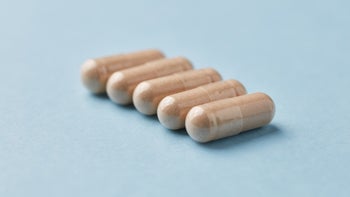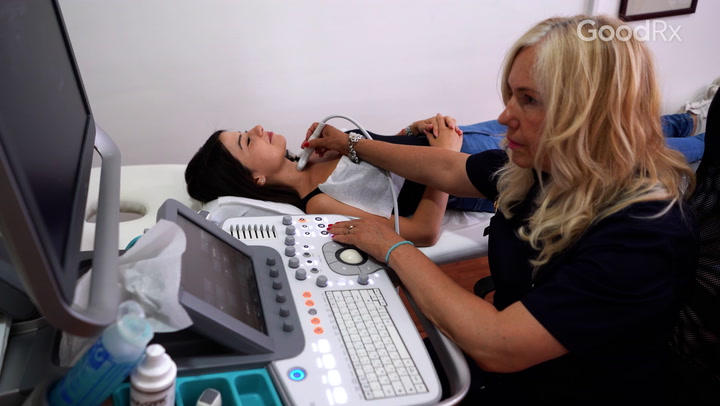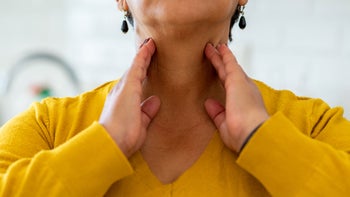
What Does Hypothyroidism Look Like in Men?
Key takeaways:
Hypothyroidism in men can cause unique symptoms, like sexual dysfunction and low testosterone.
Diagnosing hypothyroidism is the same for men and women. The diagnosis is based on symptoms and a blood test that measures how well the thyroid is working.
Treating hypothyroidism lowers your risk of long-term health problems and improves many of the symptoms.
Table of contents
Your thyroid is a gland located at the front of your neck, at the base. It makes two hormones: triiodothyronine (T3) and thyroxine (T4). These hormones help make sure that many different systems in your body are working well. Changes in these hormones can affect your health in many ways, including your metabolism, weight, and mood.
Hypothyroidism occurs when the thyroid doesn’t produce enough T3 and T4 hormones. This can result in many different symptoms, which may seem unrelated. They may even be hard to notice at first. Both men and women can experience low thyroid levels, but there are some unique symptoms.
How common is hypothyroidism in men?
Hypothyroidism is known to affect up to 5% of the general population, although significantly more people may have it without realizing it. Studies show that hypothyroidism affects between 3% and 16% of men in the U.S., with the risk increasing with age.
Women are five to eight times more likely to have thyroid issues than men.
What causes hypothyroidism in men?
The causes of hypothyroidism in women and men are similar. In the U.S., the main cause of hypothyroidism is Hashimoto’s thyroiditis. In this autoimmune condition, your immune system makes cells that attack your thyroid gland, which keeps it from working properly. Like most autoimmune diseases, Hashimoto’s is more common in women, which explains the higher rates of hypothyroidism in women.
Other causes of hypothyroidism include:
Cancer, such as thyroid cancer
Previous radiation or surgery to the thyroid or other parts of your neck
Some medications, such as lithium and amiodarone
What causes hypothyroidism? Learn the causes of low thyroid hormone levels.
Thyroid function tests: Checking your thyroid hormone levels is important for understanding your thyroid health. Here’s how the tests work.
What happens if you don’t treat hypothyroidism? Untreated hypothyroidism can lead to serious complications. Here’s how to stay safe.
What are the symptoms of hypothyroidism in men?
Although men and women experience many of the same symptoms, some are specific to and of particular concern to men. Keep in mind that most of these symptoms are reversible with treatment and proper management of your thyroid levels.
Sexual dysfunction
Sexual dysfunction refers to any problem that affects your desire for or enjoyment of sex. In men, low thyroid levels can cause several different types of sexual dysfunction. Some studies report that over 6 in 10 men with hypothyroidism have:
Low libido (sexual desire)
Delayed ejaculation
Premature ejaculation is a much less common side effect, affecting about 7% of men with the condition. Hypothyroidism has also been shown to affect semen quality and is associated with lower sperm count, form, and movement. These factors can potentially lower fertility.
Hair loss
Up to half of people with hypothyroidism experience some type of hair loss, ranging from partial to very extensive. Individual hair follicles have a specific cycle of growth and rest stages. Hypothyroidism affects this cycle, which can result in hair loss. Other hair changes can also occur with hypothyroidism, including dry, brittle, and coarse hair that may take longer to grow.
Low testosterone
Testosterone is a sex hormone that has many important roles in men’s health, including in bone and muscle growth, sex drive, and sexual reproduction.
Hypothyroidism can lower the levels of free testosterone in your blood. It has also been associated with lower levels of sex hormone-binding globulin, a protein that carries testosterone throughout your body. Both of these effects can contribute to symptoms of low testosterone in men.
Treating hypothyroidism can improve testosterone levels. If you have low testosterone, consider visiting your primary care provider to check your thyroid levels.
Muscle weakness and cramps
Hypothyroidism can also affect your muscles, causing weakness and cramps. One review of case reports over 25 years found more men than women with hypothyroidism who also developed muscle weakness.
Some studies show that about 2 in 10 people with hypothyroidism experience weak muscles, and over 3 in 10 have muscle cramps. Muscle weakness usually affects the muscles in the upper arms and legs. If this happens, it can be hard to do things like brush your hair or get up from sitting in a chair.
In rare cases, hypothyroidism can result in severe muscle problems (Hoffmann’s syndrome), causing muscles to become very large. Symptoms usually go away with treatment, but this can take time.
Experts don’t know exactly why hypothyroidism affects muscles. It’s thought that low thyroid levels may impact muscles’ metabolism and ability to work well. Some people with hypothyroidism have a high blood level of creatine kinase (CK), which happens when muscles are injured. If you have hypothyroidism, your healthcare team may monitor your CK level along with your thyroid levels.
Keep in mind that sometimes these muscle symptoms are the main — or only — symptom of hypothyroidism.
Other common symptoms of hypothyroidism in men
Hypothyroidism can cause many other common symptoms in both men and women, including:
Tiredness (fatigue): Low thyroid levels can slow your metabolism, which decreases your energy levels. About 4 in 10 people with hypothyroidism report feeling more tired than usual.
Depression: Up to 7 in 10 people with hyperthyroidism experience depression. Other mental health issues associated with the condition are anxiety, trouble concentrating, and decreased memory.
Constipation: Hypothyroidism can also slow down your gut. Nearly 2 in 10 people with low thyroid levels report constipation.
Cold sensitivity: A lower metabolism can also leave you feeling colder than normal. More than half of people with hypothyroidism report being more sensitive to the cold.
Weight gain: Because of the effects on your metabolism, another common symptom of hypothyroidism is weight gain. Over half of people with the condition see an increase in their weight, though this is usually only 5 to 10 pounds.
Dry skin: Dry skin is one of the most common symptoms of hypothyroidism, affecting over 7 in 10 people with the condition.
How is hypothyroidism diagnosed in men?
Hypothyroidism is diagnosed the same way for men and women. The diagnosis is based on symptoms and a blood test that measures how well your thyroid is working.
With the initial blood test, a healthcare professional will check your thyroid-stimulating hormone (TSH) level and possibly do another test to check your T4 level. TSH is a hormone made in your pituitary gland, and it controls how much T4 your thyroid makes. When T4 levels are low, the pituitary makes more TSH in order to increase the T4 level. In hypothyroidism, this is why TSH levels are high and T4 levels are low.
Normal TSH and T4 levels
The results of your thyroid blood test will give your healthcare team a sense of what might be going on. High TSH levels with symptoms can mean hypothyroidism, and low TSH levels with symptoms can mean hyperthyroidism (too much thyroid hormone).
Below are what are typically considered to be normal ranges for thyroid hormones in adults. Keep in mind that these “normal” ranges may vary from lab to lab, so it’s important to use each lab’s reference range.
Hormone | Normal range |
TSH | 0.5-5 mIU/mL |
Total T4 | 5-12 ug/dL |
Total T3 | 80-220 ng/dL |
What does treatment involve?
Hypothyroidism has many different symptoms — ranging from mild to severe — that can affect your quality of life. Untreated hyperthyroidism can result in serious problems, like heart disease, infertility, and even death.
Treating hypothyroidism lowers your risk of permanent problems and can also significantly improve your symptoms.
The main treatment for hypothyroidism is a thyroid-replacement pill called levothyroxine (Synthroid, Levoxyl). Levothyroxine is a chemically made (synthetic) thyroid hormone, which works just like the ones your body makes. It’s taken every day, and your healthcare team will adjust your dose based on your symptoms and blood tests. Once you find the best dose, your team will continue to monitor your blood levels.
Be sure to talk to your healthcare team about your specific symptoms and any questions you have before starting a new treatment.
Frequently asked questions
In most cases, hypothyroidism is a lifelong condition where the thyroid isn’t able to make enough thyroid hormone. So most people will need to take a thyroid-replacement medication, like levothyroxine, for life. This isn’t a cure for hypothyroidism, but medication is very effective at managing symptoms.
But if your low thyroid hormone levels are from a medication or excessive exposure to iodine, you may be able to reverse it.
There isn’t a specific diet for hypothyroidism. In general, it’s best to eat a nutritious diet with plenty of fruits, vegetables, and fiber.
That said, people with Hashimoto’s or another type of autoimmune thyroid disorders may be sensitive to iodine. Be sure to talk with your healthcare team about how iodine-rich foods like seaweed may affect you.
Yes. Hypothyroidism is a very treatable condition. With the right treatment, you can avoid thyroid-related symptoms. Keep in mind that it can take some trial and error to find the right medication dose for you. Your healthcare team can help monitor your thyroid levels and symptoms to find the best treatment for you.
The bottom line
Although hypothyroidism is more common in women, it also affects men. And it’s more likely as you age. Hypothyroidism in men can cause a range of symptoms, like weight gain, tiredness, sexual dysfunction, and low testosterone. Diagnosing hypothyroidism is based on symptoms and a blood test.
If you have hypothyroidism, it’s important to work with a healthcare professional to treat it. Treatment can help prevent long-term health problems and reverse many of the symptoms.
Why trust our experts?



References
Achappa, B., et al. (2017). Hoffmann’s Syndrome - A rare form of hypothyroid myopathy. Journal of Clinical and Diagnostic Research.
American Thyroid Association. (n.d.). General information/press room.
American Thyroid Association. (n.d.). Thyroid & weight.
Canaris, G. J., et al. (1997). Do traditional symptoms of hypothyroidism correlate with biochemical disease? Journal of Internal Medicine.
Canaris, G. J., et al. (2000). The Colorado thyroid disease prevalence study. JAMA Internal Medicine.
Carani, C., et al. (2005). Multicenter study on the prevalence of sexual symptoms in male hypo- and hyperthyroid patients. The Journal of Clinical Endocrinology & Metabolism.
Chiovato, L., et al. (2019). Hypothyroidism in context: Where we’ve been and where we’re going. Advances in Therapy.
Dumoulin, S. C., et al. (1995). Opposite effects of thyroid hormones on binding proteins for steroid hormones (sex hormone-binding globulin and corticosteroid-binding globulin) in humans. European Journal of Endocrinology.
Hage, M. P., et al. (2012). The link between thyroid function and depression. Journal of Thyroid Research.
Lause, M., et al. (2017). Dermatologic manifestations of endocrine disorders. Translational Pediatrics.
Madariaga, M. G. (2002). Polymyositis-like syndrome in hypothyroidism: Review of cases reported over the past twenty-five years. Thyroid.
Meikle, A. W. (2004). The interrelationships between thyroid dysfunction and hypogonadism in men and boys. Thyroid.
Nikoobakht, M. R., et al. (2012). The role of hypothyroidism in male infertility and erectile dysfunction. Urology Journal.
Ortona, E., et al. (2016). Sex-based differences in autoimmune diseases. Annali dell’Istituto Superiore di Sanità.
Safer, J. D. (2011). Thyroid hormone action on skin. Dermato-Endocrinology.
Sindoni, A., et al. (2016). Hypothyroid myopathy: A peculiar clinical presentation of thyroid failure. Review of the literature. Reviews in Endocrine and Metabolic Disorders.
UCLA Health. (n.d.). Normal thyroid hormone levels.
Wiersinga, W. M. (2014). Table 9-12: Reversible causes of hypothyroidism. Endotext.
Zulewski, H., et al. (1997). Estimation of tissue hypothyroidism by a new clinical score: Evaluation of patients with various grades of hypothyroidism and controls. The Journal of Clinical Endocrinology & Metabolism.

























